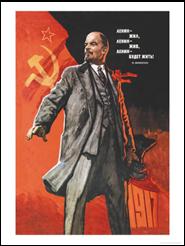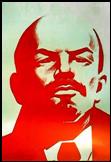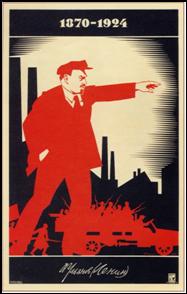Quotes by Vladimir Lenin
A lie told often enough becomes the truth.
Vladimir Lenin
A lie told often enough becomes truth.
Vladimir Lenin
A revolution is impossible without a revolutionary situation; furthermore, not every revolutionary situation leads to revolution.
Vladimir Lenin
Any cook should be able to run the country.
Vladimir Lenin
Can a nation be free if it oppresses other nations? It cannot.
Vladimir Lenin
Capitalists are no more capable of self-sacrifice than a man is capable of lifting himself up by his own bootstraps.
Vladimir Lenin
Communism is Soviet power plus the electrification of the whole country.
Vladimir Lenin
Crime is a product of social excess.
Vladimir Lenin
Democracy is indispensable to socialism.
Vladimir Lenin
Despair is typical of those who do not understand the causes of evil, see no way out, and are incapable of struggle. The modern industrial proletariat does not belong to the category of such classes.
Vladimir Lenin
Every cook has to learn how to govern the state.
Vladimir Lenin
Fascism is capitalism in decay.
Vladimir Lenin
Freedom in capitalist society always remains about the same as it was in ancient Greek republics: Freedom for slave owners.
Vladimir Lenin
Give me four years to teach the children and the seed I have sown will never be uprooted.
Vladimir Lenin
Give us the child for 8 years and it will be a Bolshevik forever.
Vladimir Lenin
If it were necessary to give the briefest possible definition of imperialism, we should have to say that imperialism is the monopoly stage of capitalism.
Vladimir Lenin
If Socialism can only be realized when the intellectual development of all the people permits it, then we shall not see Socialism for at least five hundred years.
Vladimir Lenin
It is impossible to predict the time and progress of revolution. It is governed by its own more or less mysterious laws.
Vladimir Lenin
It is true that liberty is precious - so precious that it must be rationed.
Vladimir Lenin
It is true that liberty is precious; so precious that it must be carefully rationed.
Vladimir Lenin
No amount of political freedom will satisfy the hungry masses.
Vladimir Lenin
One man with a gun can control 100 without one.
Vladimir Lenin
Our program necessarily includes the propaganda of atheism.
Vladimir Lenin
Politics begin where the masses are, not where there are thousands, but where there are millions, that is where serious politics begin.
Vladimir Lenin
Sometimes - history needs a push.
Vladimir Lenin
The best way to destroy the capitalist system is to debauch the currency.
Vladimir Lenin
The goal of socialism is communism.
Vladimir Lenin
The government is tottering. We must deal it the death blow an any cost. To delay action is the same as death.
Vladimir Lenin
The history of all countries shows that the working class exclusively by its own effort is able to develop only trade-union consciousness.
Vladimir Lenin
The most important thing when ill is to never lose heart.
Vladimir Lenin
The press should be not only a collective propagandist and a collective agitator, but also a collective organizer of the masses.
Vladimir Lenin
The way to crush the bourgeoisie is to grind them between the millstones of taxation and inflation.
Vladimir Lenin
There are no morals in politics; there is only expedience. A scoundrel may be of use to us just because he is a scoundrel.
Vladimir Lenin
To rely upon conviction, devotion, and other excellent spiritual qualities; that is not to be taken seriously in politics.
Vladimir Lenin
Under socialism all will govern in turn and will soon become accustomed to no one governing.
Vladimir Lenin
When one makes a Revolution, one cannot mark time; one must always go forward - or go back. He who now talks about the "freedom of the press" goes backward, and halts our headlong course towards Socialism.
Vladimir Lenin
When there is state there can be no freedom, but when there is freedom there will be no state.
Vladimir Lenin
While the State exists there can be no freedom; when there is freedom there will be no State.
Vladimir Lenin
Without a revolutionary theory there cannot be a revolutionary movement.
Vladimir Lenin
The progressive historical role of capitalism may be summed up in two brief propositions: increase in the productive forces of social labour, and the socialisation of that labour. But both these facts manifest themselves in extremely diverse processes in different branches of the national economy.
Lenin, The Development of Capitalism in Russia, The “The Mission of Capitalism” (1899)
Perhaps the profoundest cause of disagreement with the Narodniks is the difference in our fundamental views on social and economic processes. When studying the latter, the Narodnik usually draws conclusions that point to some moral; he does not regard the diverse groups of persons taking part in production as creators of various forms of life; he does not set out to present the sum-total of social and economic relationships as the result of the mutual relations between these groups, which have different interests and different historical roles. ...
Lenin, The Development of Capitalism in Russia, The “The Mission of Capitalism” (1899)
If the writer of these lines has succeeded in providing some material for clarifying these problems, he may regard his labours as not having been fruitless.
Lenin, The Development of Capitalism in Russia, The “The Mission of Capitalism” (1899)
In the history of modern socialism this is a phenomenon, that the strife of the various trends within the socialist movement has from national become international.
Lenin, What Is To Be Done?, “Dogmatism And ‘Freedom of Criticism’” (1901)
If democracy, in essence, means the abolition of class domination, then why should not a socialist minister charm the whole bourgeois world by orations on class collaboration?
Lenin, What Is To Be Done?, “Dogmatism And ‘Freedom of Criticism’” (1901)
Those who are really convinced that they have made progress in science would not demand freedom for the new views to continue side by side with the old, but the substitution of the new views for the old.
Lenin, What Is To Be Done?, “Dogmatism And ‘Freedom of Criticism’” (1901)
We are marching in a compact group along a precipitous and difficult path, firmly holding each other by the hand. We are surrounded on all sides by enemies, and we have to advance almost constantly under their fire. We have combined, by a freely adopted decision, for the purpose of fighting the enemy, and not of retreating into the neighbouring marsh, the inhabitants of which, from the very outset, have reproached us with having separated ourselves into an exclusive group and with having chosen the path of struggle instead of the path of conciliation. And now some among us begin to cry out: Let us go into the marsh! And when we begin to shame them, they retort: What backward people you are! Are you not ashamed to deny us the liberty to invite you to take a better road! Oh, yes, gentlemen! You are free not only to invite us, but to go yourselves wherever you will, even into the marsh. In fact, we think that the marsh is your proper place, and we are prepared to render you every assistance to get there. Only let go of our hands, don’t clutch at us and don’t besmirch the grand word freedom, for we too are “free” to go where we please, free to fight not only against the marsh, but also against those who are turning towards the marsh!
Lenin, What Is To Be Done?, “Dogmatism And ‘Freedom of Criticism’” (1901)
In a country ruled by an autocracy, with a completely enslaved press, in a period of desperate political reaction in which even the tiniest outgrowth of political discontent and protest is persecuted, the theory of revolutionary Marxism suddenly forced its way into the censored literature before the government realised what had happened and the unwieldy army of censors and gendarmes discovered the new enemy and flung itself upon him.
Lenin, What Is To Be Done?, “Criticism in Russia” (1901)
This fear of criticism displayed by the advocates of freedom of criticism cannot be attributed solely to craftiness. No, the majority of the Economists look with sincere resentment upon all theoretical controversies, factional disagreements, broad political questions, plans for organising revolutionaries, etc.
Lenin, What Is To Be Done?, “Criticism in Russia” (1901)
History has now confronted us with an immediate task which is the most revolutionary of all the immediate tasks confronting the proletariat of any country. The fulfilment of this task, the destruction of the most powerful bulwark, not only of European, but (it may now be said) of Asiatic reaction, would make the Russian proletariat the vanguard of the international revolutionary proletariat. And we have the right to count upon acquiring this honourable title, already earned by our predecessors, the revolutionaries of the seventies, if we succeed in inspiring our movement, which is a thousand times broader and deeper, with the same devoted determination and vigour.
Lenin, What Is To Be Done?, “Criticism in Russia” (1901)
Every question “runs in a vicious circle” because political life as a whole is an endless chain consisting of an infinite number of links. The whole art of politics lies in finding and taking as firm a grip as we can of the link that is least likely to be struck from our hands, the one that is most important at the given moment, the one that most of all guarantees its possessor the possession of the whole chain.





